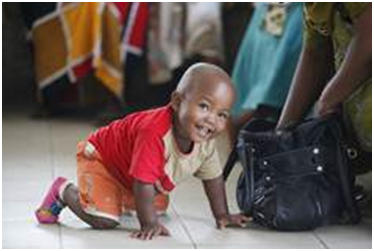Lullabies and vaccines
|

Restful nights mean better tomorrows for families, communities, and nations. Rotavirus vaccines are one of the latest tools for moms globally.
Precious sleep. From birth, it is essential to our health and well-being. And no one knows this more than a new mother: the sleep her infant needs, and the glorious—albeit inadequate—hours she can snatch in the seemingly endless cycle of waking, resting, changing, feeding, and soothing.
Precious, yet precarious. So little can make so big a difference in the restful and restorative sleep a baby needs. From colic, teething, the slightest change in a routine, or a tiny tummy's ache, a new mother knows the perils that threaten a sound afternoon nap or a solid night's sleep all too well. But she also quickly learns her best defenses. Lullabies, teething rings… and vaccines?
Rotavirus vaccine is the latest child health hero, and it can go a long way toward restful nights, by ensuring stomach and intestinal health as well as reducing a mother's anxiety. Rotavirus is the leading cause of severe childhood diarrhea, and it does not know geographical or socio-economic boundaries. It is virulent and resilient—nearly all unvaccinated children worldwide will have at least one rotavirus infection by age 3. But when vaccination is routine—with new vaccines introduced as recently as 2006—rotavirus infections plummet dramatically, and clinicians and researchers also note a marked reduction of infant diarrhea from any cause.
But though rotavirus diarrhea crosses all boundaries, equity is not universal when it comes to rotavirus vaccination. The sad irony is that access to vaccines is lowest in settings where disease burden is highest. If we work together to get them in practice at every clinic worldwide, rotavirus vaccines stand to make a lasting impact far beyond a restful nap - and far beyond the health benefit to the children vaccinated.
When a baby is fully vaccinated, the protective effects are immediate, yet the health, educational, social, and economic impacts are long term. A mother misses fewer work days due to a child's illness. Household and government expenditures for health care costs are significantly lower. When child health is protected, families are more stable, leading to the growth of communities and nations. A nation is strong when it has the resources to ensure that its children don't die from a preventable illness. In rich countries, episodes of diarrhea that may interrupt a child's restful sleep are inconvenient. In low resource settings, they can be deadly.
The good news is that the global health community has woken up to acknowledge the threat of rotavirus and the promise of rotavirus vaccines. Ultimately, mothers and their infants will be able to access rotavirus vaccines freely through public sector health systems. First, with support from international donors and coalitions, and eventually with national governments bearing the cost of supply and delivery. Countries in sub-Saharan Africa are beginning to add rotavirus vaccines to routine immunization programs, and emerging-country manufacturers are working on new vaccines that will increase market competition and drive down price. When rotavirus vaccines are included in an integrated approach to diarrhea control that includes both prevention and treatment interventions, children have their greatest chance ever at a healthy start - including precious, uninterrupted rest to nourish the growth of strong bodies. That ought to make mothers worldwide sleep a little easier, too.
-- Deobrah Phillips, Communications Officer, and Hope Randall, Communications Associate for defeatDD at PATH
For more information:
-- Rota-what? Learn more about rotavirus.
-- Zambia is preparing for a national rotavirus vaccine rollout, and the defeatDD team got a first hand glimpse of the preparation.














